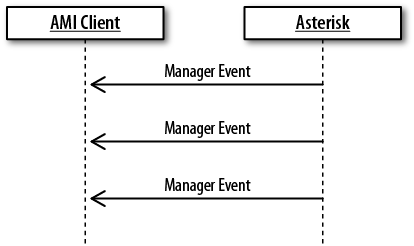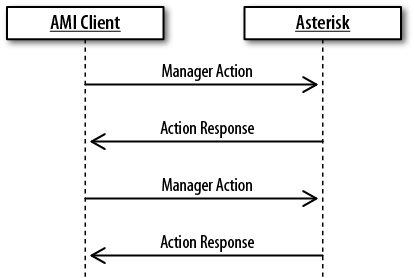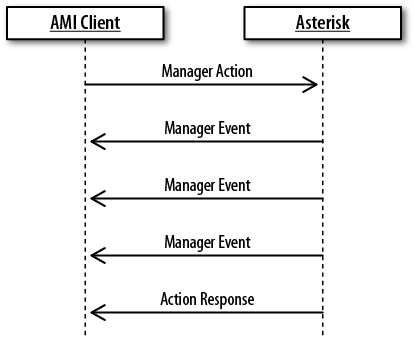There are two main types of messages on the Asterisk Manager Interface: manager events and manager actions.
Manager events are one-way messages sent from Asterisk to AMI clients to report something that has occurred on the system. See Figure 20.1, “Manager events” for a graphical representation of the transmission of manager events.
Manager actions are requests from a client that have associated responses that come back from Asterisk. That is, a manager action may be a request that Asterisk perform some action and return the result. For example, there is an AMI action to originate a new call. See Figure 20.2, “Manager actions” for a graphical representation of a client sending manager actions and receiving responses.
Other manager actions are requests for data that Asterisk knows about. For example, there is a manager action to get a list of all active channels on the system: the details about each channel are delivered as a manager event. When the list of results is complete, a final message will be sent to indicate that the end has been reached. See Figure 20.3, “Manager actions that return a list of data” for a graphical representation of a client sending this type of manager action and receiving a list of responses.
All AMI messages, including manager events, manager actions, and manager action responses, are encoded in the same way. The messages are text-based, with lines terminated by a carriage return and a line-feed character. A message is terminated by a blank line:
Header1: This is the first header<CR><LF> Header2: This is the second header<CR><LF> Header3: This is the last header of this message<CR><LF> <CR><LF>
Manager events always have an Event
header and a Privilege header. The
Event header gives the name of the event, while the
Privilege header lists the privilege levels
associated with the event. Any other headers included with the event
are specific to the event type. Here’s an example:
Event: Hangup
Privilege: call,all
Channel: SIP/0004F2060EB4-00000000
Uniqueid: 1283174108.0
CallerIDNum: 2565551212
CallerIDName: Russell Bryant
Cause: 16
Cause-txt: Normal Clearing
When executing a manager action, it
must include the Action
header. The Action header identifies which manager
action is being executed. The rest of the headers are arguments to the
manager action. Some headers are required.
Tip
To get a list of the headers associated with a particular manager action, type manager show command <Action> at the Asterisk command line. To get a full list of manager actions supported by the version of Asterisk you are running, enter manager show commands at the Asterisk CLI.
The final response to a manager action is
typically a message that includes the Response
header. The value of the Response header will be
Success if the manager action was successfully
executed. If the manager action was not successfully executed, the
value of the Response header will be
Error. For example:
Action: Login Username: russell Secret: russellResponse: Success Message: Authentication accepted
In addition to the native TCP interface, it is also possible to access the Asterisk Manager Interface over HTTP. Programmers with previous experience writing applications that use web APIs will likely prefer this over the native TCP connectivity.
There are two methods of performing authentication
against the AMI over HTTP. The first is to use the
Login action, similar to authentication with the
native TCP interface. This is the method that was used in the
quick-start example, as seen in the section called “AMI over HTTP”. The second authentication option is
HTTP digest authentication.[166] The next three sections discuss each of the AMI over
HTTP encoding options. To indicate that HTTP digest authentication
should be used, prefix the encoding type with an
a.
Once successfully authenticated,
Asterisk will provide a cookie that
identifies the authenticated session. Here is an example response to
the Login action that includes a session cookie
from Asterisk:
$ curl -v "http://localhost:8088/rawman?action=login&username=hello&secret=world"
* About to connect() to localhost port 8088 (#0)
* Trying 127.0.0.1... connected
* Connected to localhost (127.0.0.1) port 8088 (#0)
> GET /rawman?action=login&username=hello&secret=worlda HTTP/1.1
> User-Agent: curl/7.19.7 (x86_64-pc-linux-gnu) libcurl/7.19.7
OpenSSL/0.9.8k zlib/1.2.3.3 libidn/1.15
> Host: localhost:8088
> Accept: */*
>
< HTTP/1.1 200 OK
< Server: Asterisk/1.8.0-beta4
< Date: Tue, 07 Sep 2010 11:51:28 GMT
< Connection: close
< Cache-Control: no-cache, no-store
< Content-Length: 55
< Content-type: text/plain
< Cache-Control: no-cache;
< Set-Cookie: mansession_id="0e929e60"; Version=1; Max-Age=60
< Pragma: SuppressEvents
<
Response: Success
Message: Authentication accepted
* Closing connection #0
The rawman encoding type is what has
been used in all the AMI over HTTP examples in this chapter so far.
The responses received from requests using rawman
are formatted in the exact same way that they would be if the requests
were sent over a direct TCP connection to the AMI.
The manager encoding type provides a
response in simple HTML form. This interface is primarily useful for
experimenting with the AMI. Here is an example
Login using this encoding type:
$ curl -v "http://localhost:8088/manager?action=login&username=hello&secret=world"
* About to connect() to localhost port 8088 (#0)
* Trying 127.0.0.1... connected
* Connected to localhost (127.0.0.1) port 8088 (#0)
> GET /manager?action=login&username=hello&secret=world HTTP/1.1
> User-Agent: curl/7.19.7 (x86_64-pc-linux-gnu) libcurl/7.19.7
OpenSSL/0.9.8k zlib/1.2.3.3 libidn/1.15
> Host: localhost:8088
> Accept: */*
>
< HTTP/1.1 200 OK
< Server: Asterisk/1.8.0-beta4
< Date: Tue, 07 Sep 2010 12:19:05 GMT
< Connection: close
< Cache-Control: no-cache, no-store
< Content-Length: 881
< Content-type: text/html
< Cache-Control: no-cache;
< Set-Cookie: mansession_id="139deda7"; Version=1; Max-Age=60
< Pragma: SuppressEvents
<
<title>Asterisk™ Manager Interface</title><body bgcolor="#ffffff">
<table align=center bgcolor="#f1f1f1" width="500">
<tr><td colspan="2" bgcolor="#f1f1ff"><h1>Manager Tester</h1></td></tr>
<tr><td colspan="2" bgcolor="#f1f1ff"><form action="manager" method="post">
Action: <select name="action">
<option value="">-----></option>
<option value="login">login</option>
<option value="command">Command</option>
<option value="waitevent">waitevent</option>
<option value="listcommands">listcommands</option>
</select>
or <input name="action"><br/>
CLI Command <input name="command"><br>
user <input name="username"> pass <input type="password" name="secret"><br>
<input type="submit">
</form>
</td></tr>
<tr><td>Response</td><td>Success</td></tr>
<tr><td>Message</td><td>Authentication accepted</td></tr>
<tr><td colspan="2"><hr></td></tr>
* Closing connection #0
</table></bodyThe mxml encoding type provides
responses to manager actions encoded in XML. Here is an example
Login using the mxml encoding
type:
$ curl -v "http://localhost:8088/mxml?action=login&username=hello&secret=world"
* About to connect() to localhost port 8088 (#0)
* Trying 127.0.0.1... connected
* Connected to localhost (127.0.0.1) port 8088 (#0)
> GET /mxml?action=login&username=hello&secret=world HTTP/1.1
> User-Agent: curl/7.19.7 (x86_64-pc-linux-gnu) libcurl/7.19.7
OpenSSL/0.9.8k zlib/1.2.3.3 libidn/1.15
> Host: localhost:8088
> Accept: */*
>
< HTTP/1.1 200 OK
< Server: Asterisk/1.8.0-beta4
< Date: Tue, 07 Sep 2010 12:26:58 GMT
< Connection: close
< Cache-Control: no-cache, no-store
< Content-Length: 146
< Content-type: text/xml
< Cache-Control: no-cache;
< Set-Cookie: mansession_id="536d17a4"; Version=1; Max-Age=60
< Pragma: SuppressEvents
<
<ajax-response>
<response type='object' id='unknown'>
<generic response='Success' message='Authentication accepted' />
</response>
* Closing connection #0
</ajax-response>When connected to the native TCP interface for the AMI,
manager events are delivered asynchronously. When using the AMI over
HTTP, events must be retrieved by polling for them. Events are
retrieved over HTTP by executing the WaitEvent
manager action. The following example shows how events can be
retrieved using the WaitEvent manager action. The
steps are:
The interaction looks like this:
$wget --save-cookies cookies.txt \>"http://localhost:8088/mxml?action=login&username=hello&secret=world" -O -<ajax-response> <response type='object' id='unknown'> <generic response='Success' message='Authentication accepted' /> </response> </ajax-response> $wget --load-cookies cookies.txt "http://localhost:8088/mxml?action=waitevent" -O -<ajax-response> <response type='object' id='unknown'> <generic response='Success' message='Waiting for Event completed.' /> </response> <response type='object' id='unknown'> <generic event='PeerStatus' privilege='system,all' channeltype='SIP' peer='SIP/0000FFFF0004' peerstatus='Registered' address='172.16.0.160:5060' /> </response> <response type='object' id='unknown'> <generic event='WaitEventComplete' /> </response> </ajax-response>
[166] At the time of writing, there is a problem with HTTP digest authentication that prevents it from working properly. Issue 18598 in the Asterisk project issue tracker has been opened for this problem. Hopefully it will be fixed by the time you read this.


